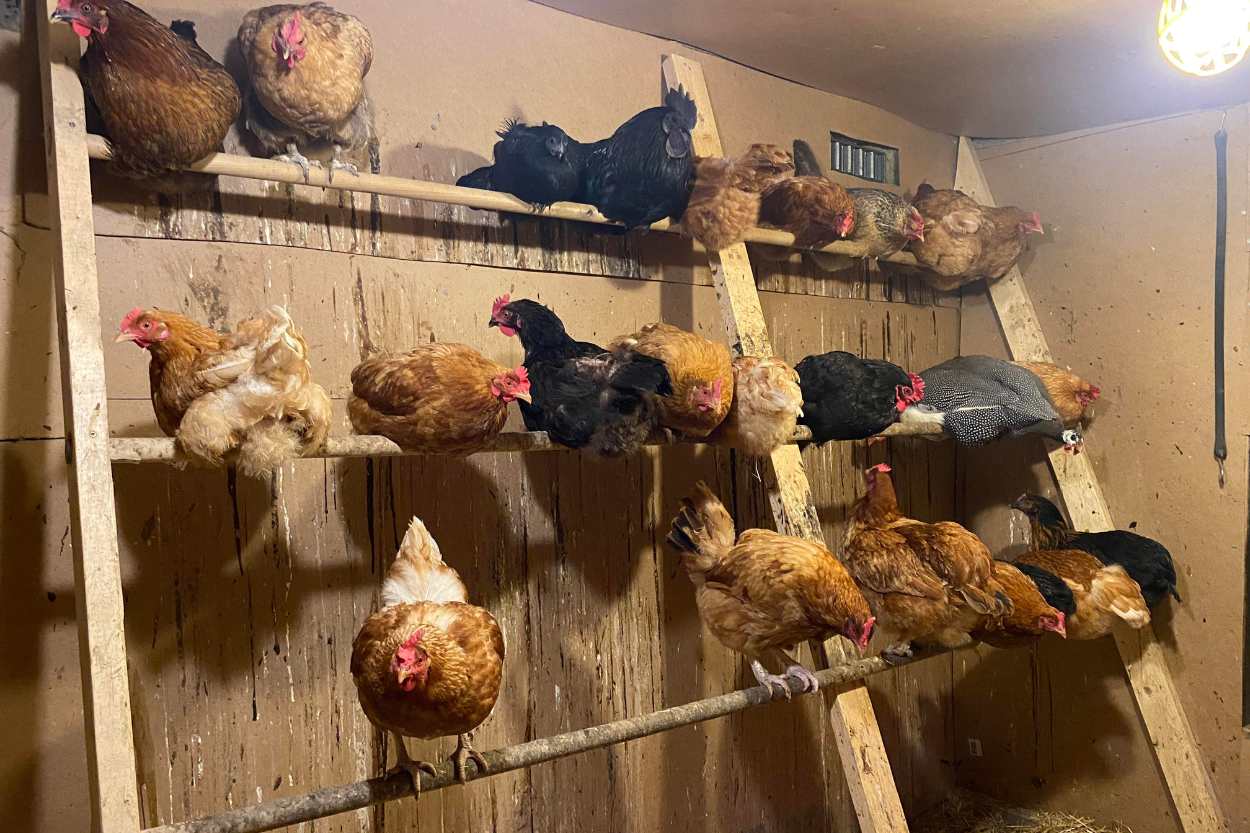Like humans, chickens are prone to behavioral and physical problems once they don’t get a good night’s sleep. Well, there is an easy way to prevent these from happening– not interrupting their sleeping pattern!
There are many factors to keep your flock in a healthy sleeping pattern. One of them is not adding unnecessary night lights to their coop. Do chickens need light at night? Actually, no, though certain situations may necessitate it. Continue reading as we discuss the appropriate conditions for a chicken’s nighttime environment.
Do Chickens Need Light at Night?
It is understandable why poultry farmers think their flock needs light at night. After all, light directly affects the egg-laying production of chickens. Others also use night light to prevent predators from coming to the coop and attacking the defenseless chickens while everyone else is sound asleep.
However, a seasoned poultry farmer would know that chickens do not need light at night. Chickens require both darkness and light to survive. In fact, there is only a significant number of hours for chicken’s exposure to daylight and darkness.
- Daylight – Chickens require 14 to 16 hours of light daily to function properly and be at optimum egg-laying capacity.
- Darkness – To get good sleep and rest, chickens need 6 to 8 hours of uninterrupted darkness daily.
It is crucial to consider your location because the location and seasons in each country may also affect the hours of darkness and daylight. For example, in the United States of America, the days are longer from June to September; meanwhile, it is shorter from December to March. Understanding this simple information will help as a basis for adjusting your chicken’s needed care.
Do Chicks Need Light at Night?
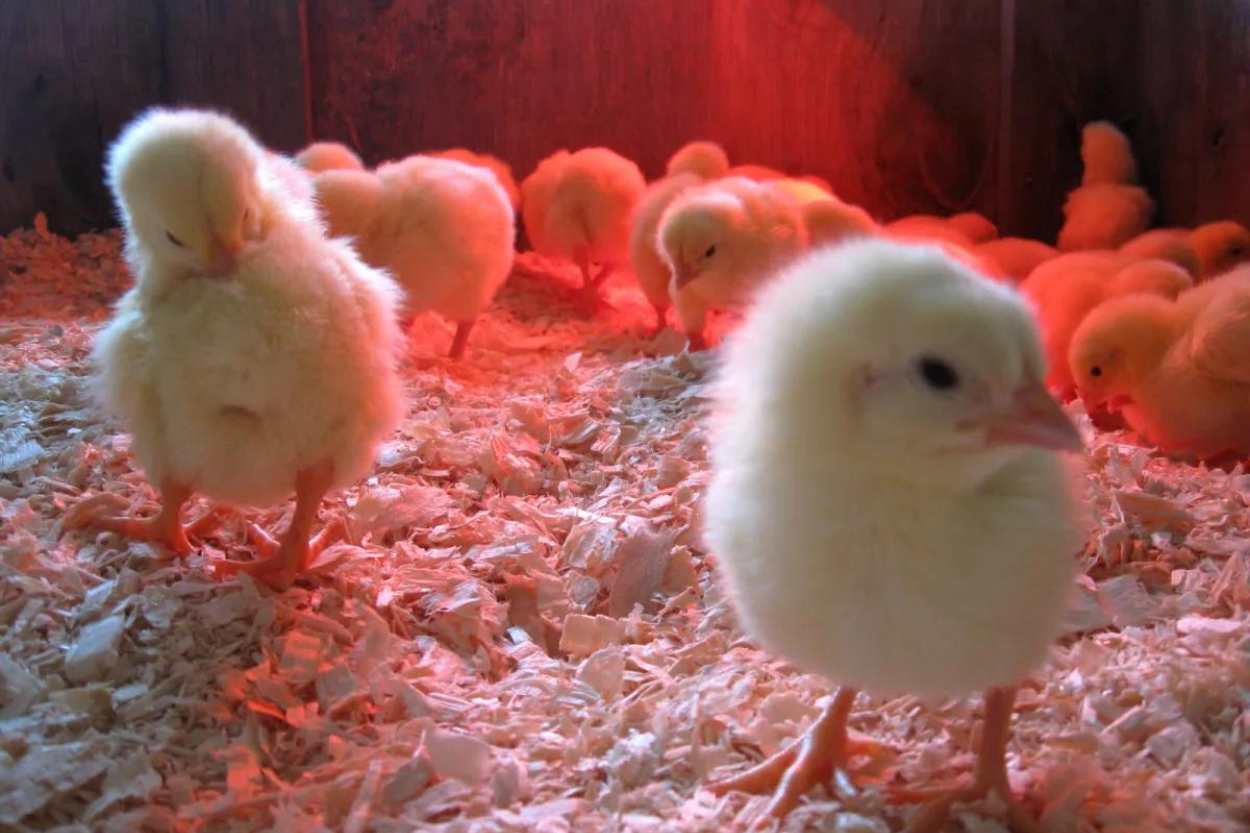
Since chicks are very delicate, there are considerations when deciding whether to install a night light in their coop. Newly hatched chicks may need light at night for about a month after birth, especially if separated from their hens. However, if they are cooped up with their hens, you may leave them without light.
Chicks also need the same daylight and darkness hours as adult chickens. However, since chicks require more supervision due to their fragile bodies, keeping a light source in their coop is advisable. It ensures they can see in the dark since their eyesight has yet to develop fully. It will also aid them in finding their water, feeds, and roosting area.
Moreover, newborn chicks are considered Poikilothermic, implying that their body temperature depends on their environment. The ideal temperature for chicks lies between 60-65°F. If their ambiance is within this range, they won’t need a heater or a supplemental light to keep them warm. If you prefer a more natural way to control their temperature, keep them in the same coop as their hens.
Remember that the main reason why chicks need light is because it helps regulate their body temperature, not due to their necessity for light itself!
When to Use a Night Light in the Coop?
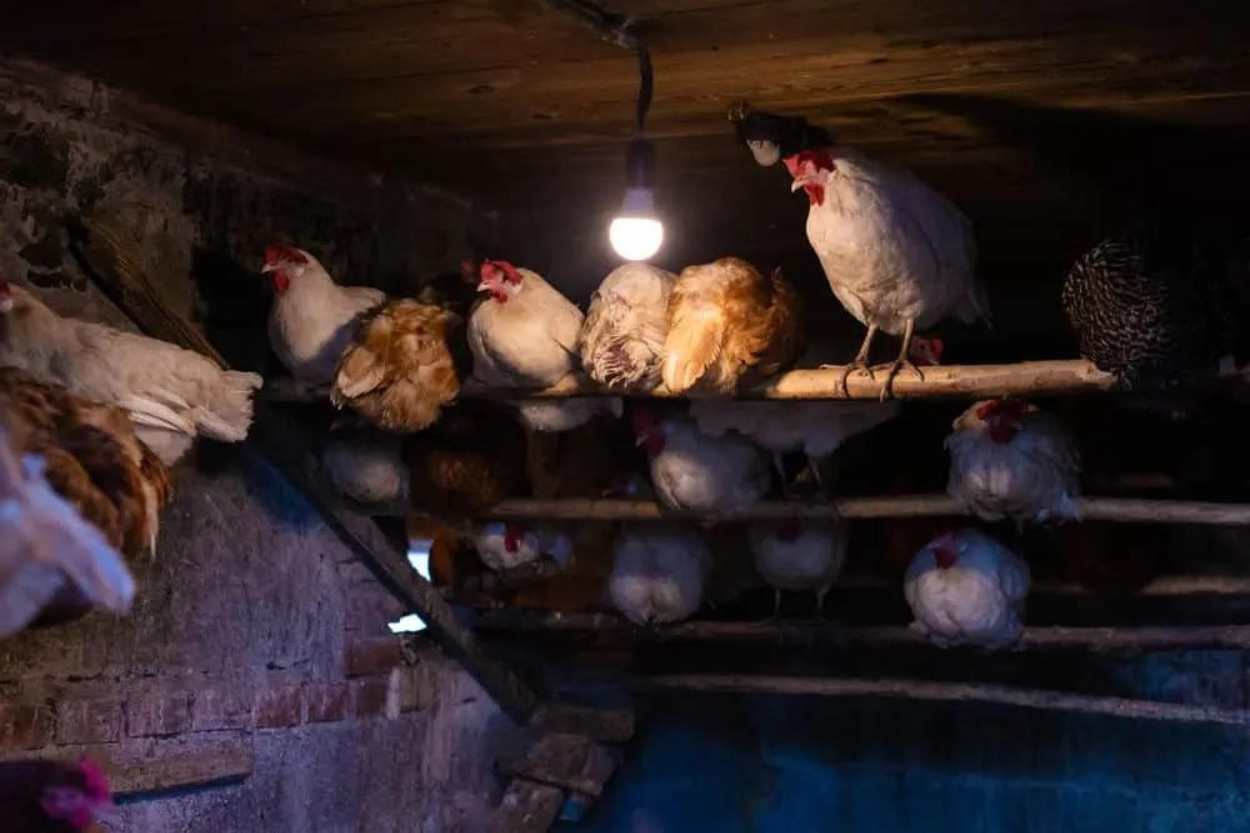
Before Dusk & Dawn
Maintaining the darkness in the coop is just as important as providing them with a guiding light during dusk and dawn. During these times, a light will help your chickens find their way back into the coop, especially if they are foraging during the day. A low-intensity light is also valuable for preventing confusion due to sudden changes between daylight and darkness.
Once the flock is already settled in their respective roosting area, turn off the light so they can sleep and rest. Some poultry farmers use automatic timers, so they won’t need to monitor the light in their coop manually.
During Winter (Optional)
There are split opinions about using light in the coop during winter. In this short clip, a poultry owner says that adding supplemental light is unnecessary and will only hinder chicken bodies’ natural process (like molting).
However, other reasonable arguments state that it is challenging to fill the light requirement of chickens during winter because this season has the shortest daytime. To keep up, adding light at night would be helpful. Using light will also help to keep the coop’s cold temperature tolerable.
Since there are different perspectives about this, it is up to you– the owner, which do you think will be best for your flock.
What Happens When You Give Too Much Light to Chickens?
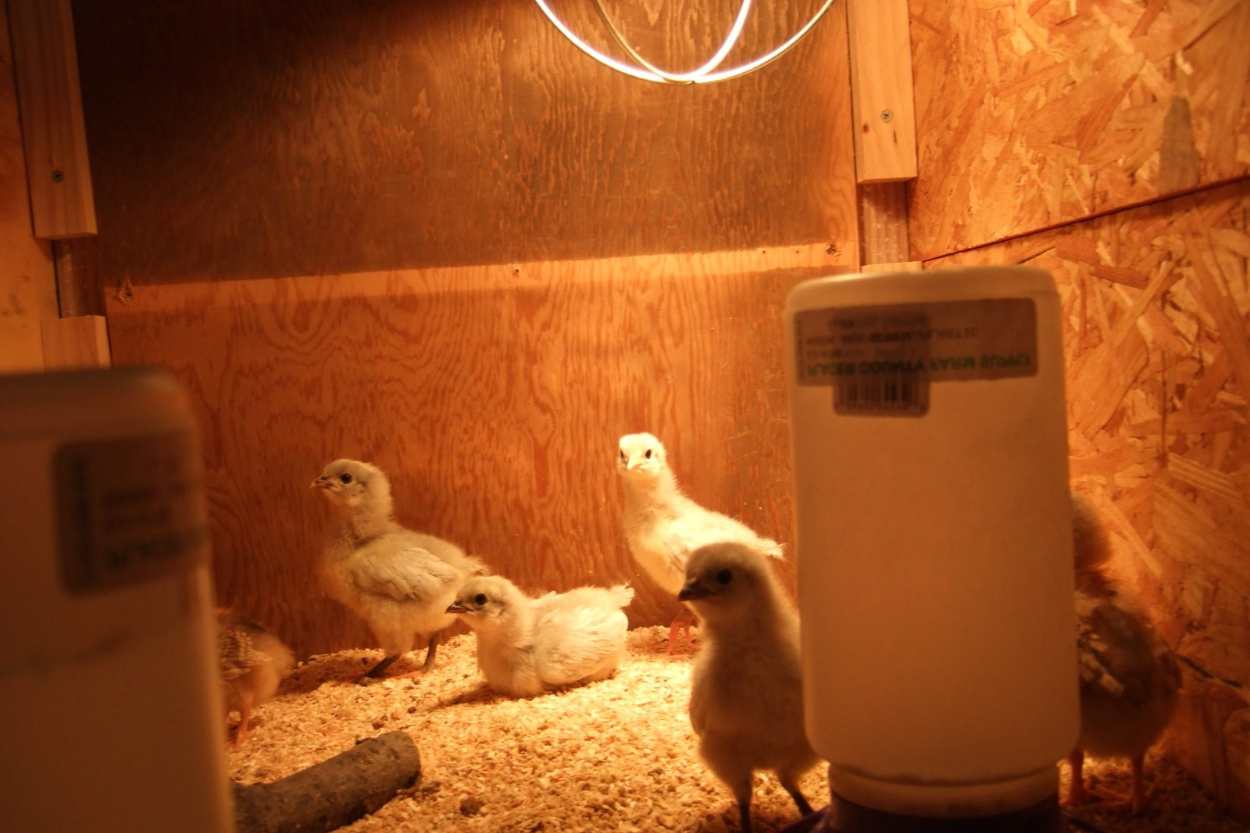
One of the benefits of having a backyard farm is the unlimited supply of freshly hatched eggs. The rush of eating or selling all these is exciting, so some farmers would do their best to keep the produce coming. Even if it takes adding unnecessary lights to the coop for faster egg production.
But do you know that giving your flock too much light might harm them? Read the list below about the possible effects of too much light on chickens!
- Overstimulation and stress
- Aggressive behaviors
- Ovarian cancer(due to too much egg production)
- Imbalance growth (Mostly for pullets; overexposure to light will cause imbalance in body growth)
- Confusion (which leads to chaotic sleeping patterns)
2 Benefits of Uninterrupted Sleep for Chickens
Chickens benefit from sound, uninterrupted sleep every night. Hence, giving them the best rest they can get is crucial to preventing health and behavioral concerns. Further understanding of how chickens sleep will also aid in providing them with the best environment possible.
- Optimal physical health
During sleep, a chicken’s body regenerates, promoting optimal digestive and immune system health. Without complete rest, chickens’ bodies may fall ill and be at risk of different kinds of diseases. Lack of sleep may also affect their reproductive system; roosters with complete rest will have a higher reproduction rate, while hens will not have trouble laying eggs.
- Pleasant behavior
Do you have an agitated chicken in your flock? If yes, you should look closer at their sleeping pattern and nighttime surroundings. Chickens tend to peck at each other and become violent when they lack sleep. Observe your flock, and recognize that chickens that slept ideally tend to be more friendly to both humans and the rest of the coop.
Can Chickens See in the Dark?
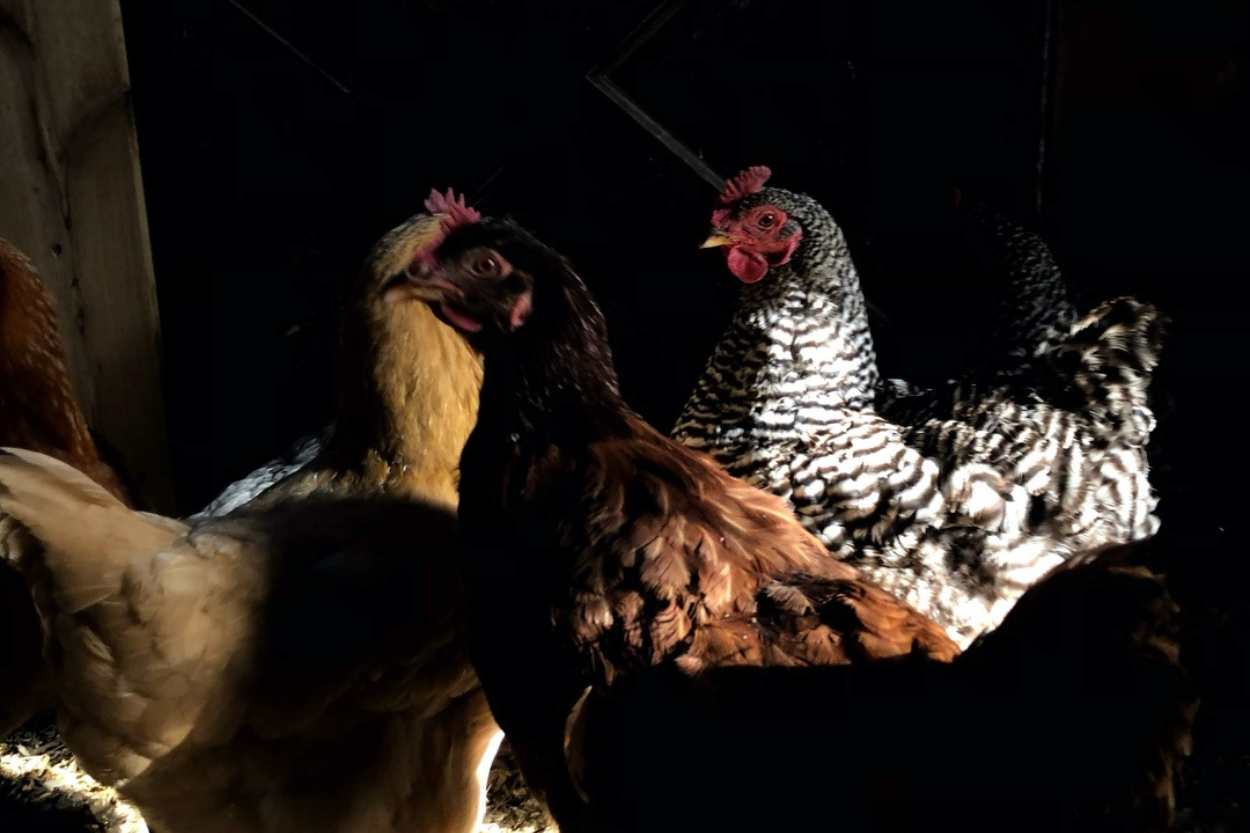
The eyes of chickens are placed on the sides, which explains their 300-degree fields of vision. These animals are also tetrachromatic, meaning they have four cones, allowing them to see more colors than humans, like blue, red, green light, and ultraviolet light. All of these traits are the reason why chickens have excellent eyesight.
However, chickens have limited night vision due to having fewer rods—the photoreceptor cells required for low-light vision. Therefore, they struggle to see in the dark without artificial light. During the nighttime, the light level drops; hence, chickens slowly lose their ability to see.
Nevertheless, chickens can distinguish between darkness and light through the Avial pineal gland. Using this gland, chickens may still synchronize themselves with the change of time and seasons.
Is it Okay to Put Light in a Coop?
Yes, you can add light to the coop because it will be helpful for various reasons. Light may be used to guide and protect them inside the cell. It can also aid in increasing the temperature of their bodies. Most of all, adding light may increase their egg-laying capacity, especially when they reach the numbers of daylight they need.
However, ensure that you will use the light moderately and only when needed because overexposure to light may also stress the flock. Complete darkness is what chickens require, particularly during the sleeping or roosting period.
What is Supplementary Lighting in the Coop?
From the word itself, supplementary lighting is a strategy to provide the chickens with additional lighting when natural light is expected to be low. It is used to mimic natural light. It is often operated during winter when daylight hours are reduced or during the first few days of the chicks when they need more light.
Despite the advantages, utilizing a supplemental light in the coop should still be taken into strict consideration. You need to consider some factors, like the light’s color, intensity, duration of use, etc. Low light intensity is ideal for chickens between 5 to 15 lumens. In terms of the period, it varies depending on the location and the flock’s needs.
What kind of bulb is used for chickens?
Back then, incandescent bulbs were the most common bulbs we could see at coops. But, as time passes, fluorescent and LED lights are also up in the choices. All of these affect the chickens, but for a safer alternative, try using warm white fluorescent bulbs. Also, prevent installing blue, red, or green lights, as these don’t mimic the color of natural sunlight.
Conclusion
Did we answer your question: do chickens need light at night? We hope we did and you learned something! Again, flocks do not need any more night light as long as the natural sunlight sustains their light requirement. If not, install supplemental light in the coop, but use it with extreme caution. Do not use it to interrupt their good night’s sleep!

Joseph Hudson has been raising chickens for over 15 years. In 2018, he completed the Agriculture & Natural Resources program at Mt. San Antonio College. He currently raises over 1400 chickens on his 7.5-hectare farm. He keeps sharing his experience on raising healthy and happy chickens on Chicken Scratch The Foundry.
